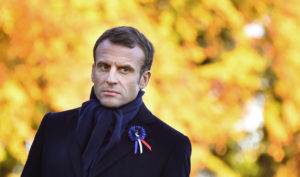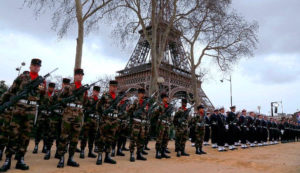France — in reality, Emmanuel Macron — has taken up the presidency of the EU, or “our Europe”, as he calls it. He set the scene with a typically magniloquent speech to the European parliament, meeting symbolically (as the French insist) in Strasbourg. Some of the speech was the kind of boastful Euro-nationalism I have always found distasteful: about Europe’s “unique civilization”, its “invention” of democracy, its “solidarity unique in the world”, its “incomparable culture”, “our uniqueness as Europeans,” and so on.
When to this rhetoric are added fanciful claims about the EU’s unique vaccine success (based on its “unique solidarity” — patently lacking) and its efforts to advance “the sovereignty of peoples” (which it is busily undermining), one is tempted to conclude that everyone knows this is just flim-flam to gratify its audience of Euro MPs. A dash of cynicism rarely goes amiss, and the simplest explanation is that Macron is facing an election in April, and wants to buttress his image as the philosopher-king of both Europe and France.
Macron is now the only tirelessly enthusiastic Europhile among France’s leading politicians. When he was elected in 2017, he was the only candidate standing on a “European” platform. That will be true again this year. It may seem a risky strategy, as the French electorate is no more Europhile than the British was. But the French, whatever their misgivings about the EU, are more resigned to it. Marine Le Pen crashed in the last presidential campaign when she could not explain how to get out of the eurozone, which is the crucial issue.
Besides, what most people in France feel about the EU does not much matter. In reaction to the parliamentary systems of the Third and Fourth Republics, the presidential system of the Fifth, designed for Charles de Gaulle, provides France with a “republican monarch” to provide national leadership, especially in foreign policy. This means doing what the elite thinks is in the national interest. De Gaulle put it memorably: how can you govern a nation with 246 sorts of cheese? The answer is by not being guided by the cheese-makers.
France, even more than most democracies, has government by an elite, practically a caste. I once asked a rising young French diplomat how it was that they all seemed to agree. He unhesitatingly said it was learnt at “Sciences Po”. The distinguished Institut des Sciences Politiques was deliberately set up in the 1870s, after a disastrous cycle of revolutions and defeats, to “create a brain for the people”. Sciences Po graduates, and those from other elite training schools, most famously the École Polytechnique and the École Nationale d’Administration (which Macron attended, after graduating from Sciences Po), still shape the brain that runs France. Unlike elite educational establishments in Britain or the United States — Oxbridge or the Ivy League, for example — these are smaller, more exclusive, and above all dedicated primarily to State service. Like a civilian Sandhurst or West Point.
So while electoral tactics come and go, Macron is really the spokesman for a much older and deeper consensus. His Europeanism is more eloquent, but his views are little different from those of his predecessors. Part of this is a simple conviction that France is unique, and the legitimate cultural and political leader of Europe. De Gaulle famously wrote that he had always believed France dedicated “to an eminent and exceptional destiny”. As Harold Macmillan realised, when de Gaulle, “says ‘Europe’, he means ‘France’.” Macron’s Strasbourg speech, in similarly European language, reflects France’s historic fears and ambitions: plus ça change.
These fears have their roots in the catastrophe of 1870, when Prussia invaded, bombarded Paris, destroyed French primacy in Europe, and emerged as the new German Empire. Since then, relations with Germany have dominated French foreign policy, traumatically confirmed by two world wars. “France has a German policy, she has no other,” wrote a leading French commentator soon after the end of the Second World War. Her European policy is her German policy.
After 1870, it took 50 years for France’s strategy for recovery to be worked out. At first, there were bitter partisan divisions — bitter enough to get a leading politician shot leaving parliament — about whether true patriotism meant responding to defeat by turning away from Europe to gain colonies or concentrating forces on “the blue line of the Vosges”, the mountains that ran along the new border with Germany.
In the end, the French decided to do both, creating a global empire to buttress its power in Europe. In the Twenties, realising that Germany’s defeat in the First World War had not destroyed its power, and that France could not rely on British or American support, Paris proposed European integration.
This was to be the means of both reconciling and controlling Germany. After a promising start, it failed during the Thirties. But the idea never went away, and the second defeat of Germany, in 1945, produced the same logic, especially when again Britain and America seemed, in French eyes, to be unreliable allies. European integration, culminating in the creation of the euro, was to be the principal means of taming German power — sweetened by fulsome expressions of friendship.
Macron’s speech shows that France’s grand strategy — the strategy of its governing caste — has been based on the same logic for nearly a century. Partnership with Germany within a European framework is the bedrock. And if Germany is unresponsive, the language becomes more enticing and the pressure more sustained. This time, Macron has told the European parliament that France and Germany have agreed to give it more power — the right to initiate legislation, hitherto the monopoly of the Commission. Not much doubt who is steering the ship.
And what of other allies? Russia — whether ruled by the tsars, the Communists or today’s plutocracy — has been a difficult but always tempting geopolitical partner: France’s principal ally from 1890 to 1917, and an ally again in 1935. And now? Macron says Russia must be negotiated with over Ukraine, to find a political compromise. Even more strikingly, he announces a “dialogue” with the Russians over the “collective security” of a new “European order”, a “security order”. This may permit the Western Balkans to join the EU, but that, he says, will require EU governance to become more centralised.
He sees the “vocation of our Europe” — of France, in other words — to be a “true balancing power”, which seems to mean more distanced from the Atlantic alliance. Part of this vision is of a new “alliance” between the EU and Africa, emphasising the connections between the two coasts of the Mediterranean, the core of the old French empire.
This is Gaullism, pure and simple. Pulling away from the “Anglo-Saxons”, emphasising the special relationship with Germany, flirting with Russia, influencing Africa. Unlike Britain, France has unashamedly clung to its imperial and post-imperial role, maintaining a military, political and financial presence in its former African colonies, legally converting far-flung island possessions into parts of France (and hence parts of the EU), and promoting la Francophonie, its Commonwealth equivalent. As noted earlier, since the 1880s it has seen its global role as complementary to its European status. European integration continues this strategy: to the outside world, France presents itself as the leader of Europe, and to Europe it presents itself as the Continent’s only global power, with nuclear weapons, overseas territories, and a UN Security Council seat. Such high-flown ambition might eventually prove illusory. But one has to admire the determination. There is no alternative plan: the die has long been cast.
Where does Britain stand in the French vision? Macron referred to “ties of friendship” with “the British people” — but pointedly not with their government. To follow “a common path” after Brexit requires Whitehall to apply “in good faith” agreements on Northern Ireland and fisheries — the “condition for staying friends”. Any Brexiteer will reply that it is France that has lacked good faith over the Northern Ireland Protocol and fishing. No matter: Macron thinks he wields the EU as a big stick, and perhaps he does.
Brexit poses both a danger and an opportunity, as has been clear since 2016. Britain cannot be allowed to leave the EU successfully, or France’s European project is threatened. But if Britain came to accept some sort of subordinate status, conforming with the EU’s (and hence France’s) political and economic “common path”, France’s position would be strengthened. The resignation of Lord Frost, who had explicitly rejected this, caused rejoicing at the Elysée, where Liz Truss seems to be seen as a lightweight.
A former European Commissioner with a keen eye for history recently told me that he thought Britain and France had been engaged, since the beginning of European integration in the Fifties, in their third Hundred Years’ War. The first, ending in 1453, was won by the French. The second, ending in 1815, by the British. In the third, we still have another three decades to go.
Disclaimer
Some of the posts we share are controversial and we do not necessarily agree with them in the whole extend. Sometimes we agree with the content or part of it but we do not agree with the narration or language. Nevertheless we find them somehow interesting, valuable and/or informative or we share them, because we strongly believe in freedom of speech, free press and journalism. We strongly encourage you to have a critical approach to all the content, do your own research and analysis to build your own opinion.
We would be glad to have your feedback.
Source: UnHerd Read the original article here: https://unherd.com




